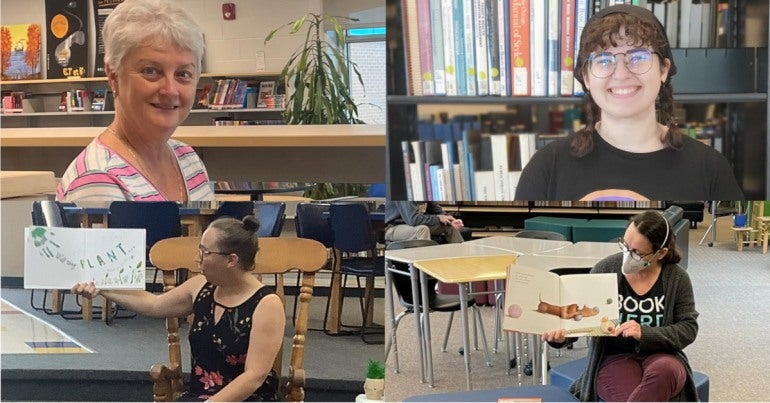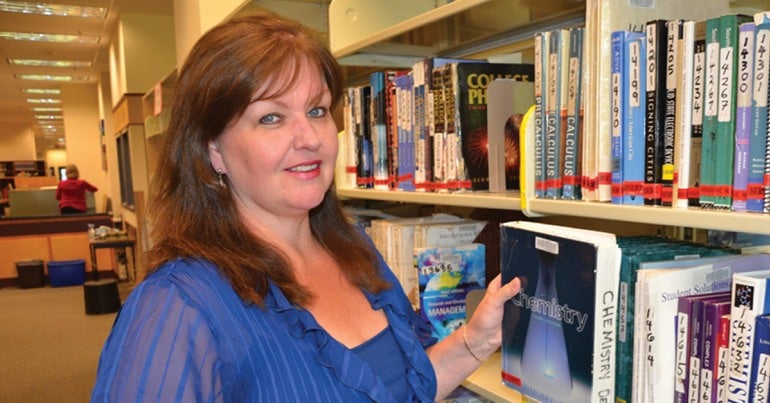 Richmond, British Columbia
Richmond, British Columbia
CUPE 718-05
“With access to the right tools and resources, everyone can have agency and be empowered.”
I have been a librarian at Richmond Public Library since 1995. I’ve worked across various branches and departments over the years, eventually returning to the Steveston branch in June, where I first started my career, to assume the role of branch librarian. I light up when I walk into a bookstore because words, ideas, and information are my wheelhouse and have led me to this career.
Before becoming a librarian, I trained and worked as a journalist. There was variety in the issues I worked on, but the tasks I performed every day were repetitive and mundane. What I cherish most about my current role is the variety it offers. Each day brings new challenges at the public service desk, where I eagerly assist patrons with so many different questions and needs – I never know what I might be asked! I relish the energy and the intellectual stimulation, even on the most chaotic days.
A lot has changed over my 28 years in the library. I began my career just as the internet was emerging, and public interest in it was growing. We ran education sessions on how to navigate the internet, which we still offer today but on a smaller scale along with more specialized digital offerings.
The library’s roles have evolved too, with dedicated staff members still providing front-line library services, but also specialists handling publicity, communications and promotional tasks that go beyond our basic partnership with a local newspaper. I remember when, in the late 1990s, I even learned HTML to manage the newspaper’s website.
I treasure the fact that libraries are one of the few truly inclusive spaces that welcome individuals from all backgrounds. We, as library staff, hold values of non-judgement, fairness, and equality, firmly believing that with access to the right tools and resources, everyone can have agency and be empowered. Libraries are great equalizers. In a world marked by growing economic disparities, rising living costs, and news media restrictions by web giants, free access to resources in libraries is more crucial than ever.
We are also consistently adapting to meet the evolving needs of our communities. We guide people in using digital technologies, provide services to those unable to visit the library in person and ensure accessibility to persons with disabilities. We also regularly connect people experiencing homelessness to a community drop-in centre.
Therefore, I’m not just a cataloger of books. We love to sleuth out a book that a parent wants to read to their child and to run valuable lifelines for new parents, such as babytimes, encouraging them to get out of the house, meet other parents, and promoting literacy through games, rhymes and songs. While navigating the library may seem straightforward, many people require our help, and we play a pivotal role in unlocking these resources for our community.
I also assemble puppet stations and deliver puppet shows to pre-schoolers. Additionally, I’ve started organizing virtual Q&A sessions since the COVID-19 pandemic with renowned authors – like Michael Ondaatje about his book In the Skin of a Lion, or Susan Juby about her book Mindful of Murder. Without library workers, all of this would vanish. As the person in charge at the library, I carry the emergency phone, stepping in to manage challenging situations when required.
I have strong skills working with the public, but it has become increasingly stressful due to growing demands and expectations, coupled with higher employer expectations, especially concerning programming. This has resulted in heavier workloads for staff, aggravated by turnover and unfilled positions in order to cut costs. Workplace violence and harassment have also become pressing issues – I have faced verbal abuse, screaming and even threats of violence. It’s very scary and distressing, even though I am the person in charge. We don’t have security guards, and I’ve had to call the police for assistance. So, while we have several tools to address incidents, they aren’t foolproof.
Despite the challenges, there are countless small moments that reveal that library workers can change lives. I see it in a newcomer’s broad smile and gratitude after successfully printing essential documents, in the voice of a visually impaired elderly man as it lights up when discussing the audiobooks we provide, or in the book club participant overcoming illness and depression to engage enthusiastically. A teacher praised our library’s warm ambience once saying, “The library is an integral part of our community that brings people together and meets many needs.”



